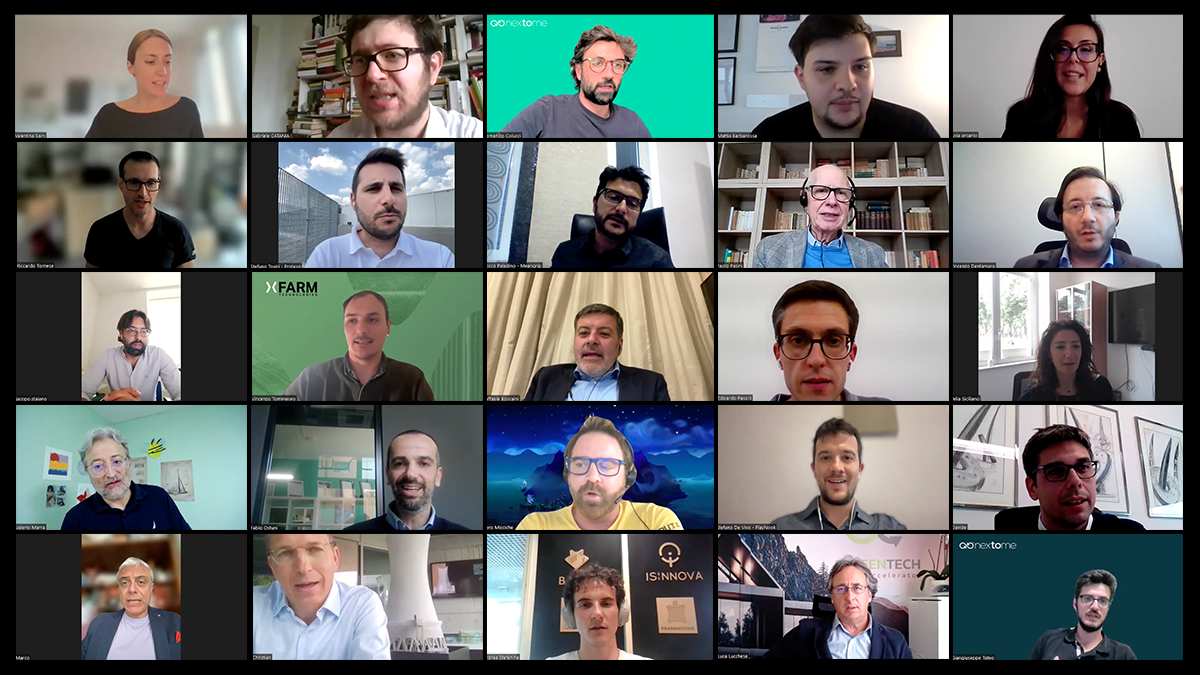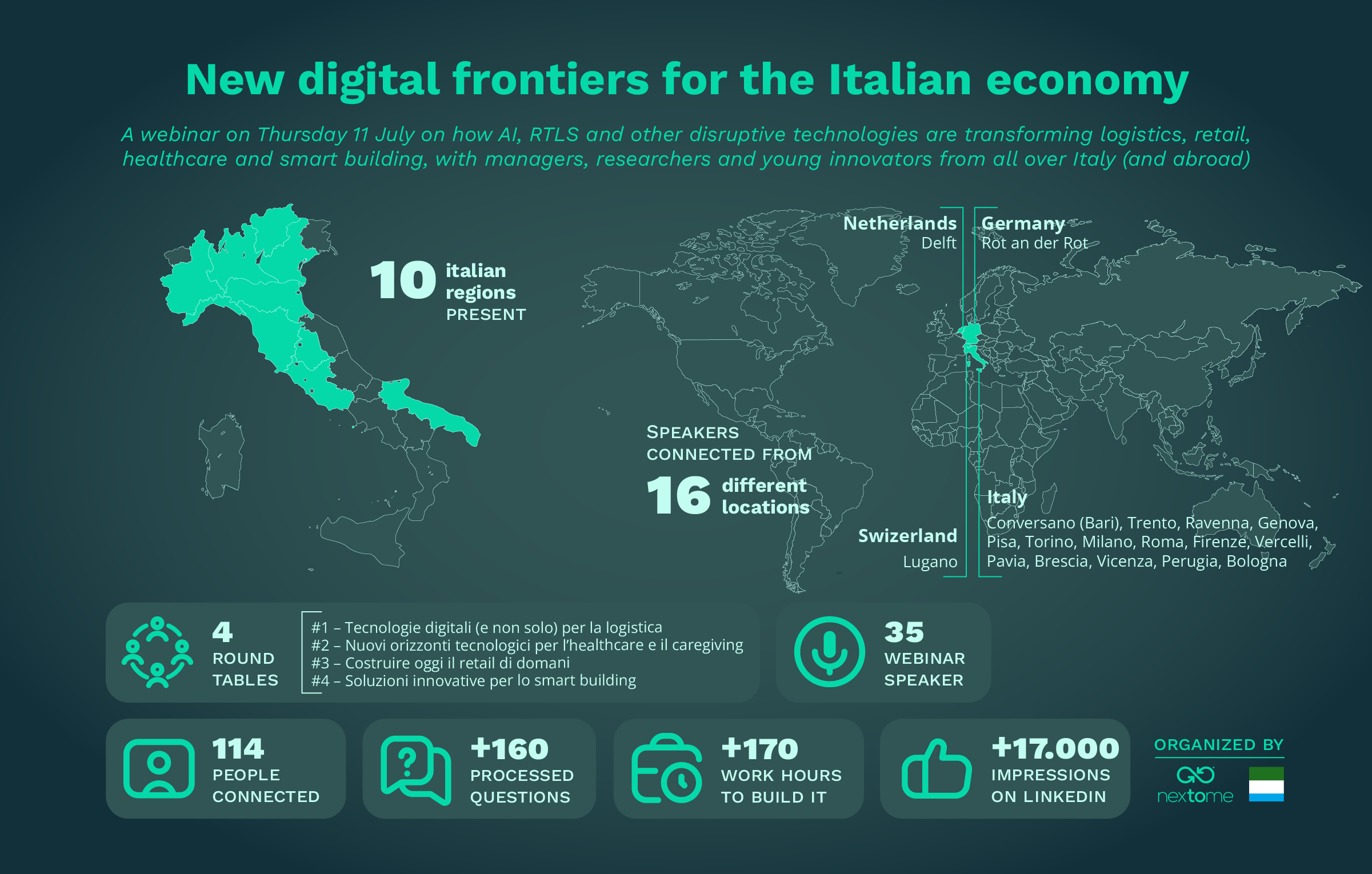A window on the (digital) future of the Italian economy
Transformation, R&D, integration, human-centred technology: these were just some of the keywords of the educational webinar ‘New digital frontiers for the Italian economy’, organised by Bericus with Nextome, and held on Thursday 11 July on Zoom. Dozens of entrepreneurs, researchers, managers and startup founders from all over Italy attended to listen to thirty-two high-profile speakers discuss the technologies that are and will be most influential in four strategic sectors for the Italian economy: logistics, healthcare, retail and smart building.
The webinar was opened by Paolo Traverso, a leading expert in artificial intelligence and director of strategic planning at the Fondazione Bruno Kessler (FBK), a major research centre at the European level. Traverso pointed out that the AI and microelectronics sectors are attracting huge investments and that "this is a time of great opportunities for innovative start-ups and SMEs able to collaborate with larger companies or, in the case of system integrators, to pivot. The applications are endless: in medicine, in the circular economy, in weather monitoring, and many others". One of the tasks of a research centre such as the FBK is to accompany companies in this radical transformation.
Speaking from his office in Conversano, Nextome co-founder and COO Domenico Colucci thanked the speakers for accepting the invitation to participate in a webinar "designed to be a time to dialogue with and learn from experts, opinion leaders, researchers and academics about what is happening in such important economic sectors," and recalled the fruitful dialogue that emerged during the previous webinar, organised by Bericus and Nextome in May, entitled "The South, Italy's techno-scientific engine". For his part, Gabriele Catania, analyst and president of Bericus, noted that "in the coming decades, the Italian economy is likely to be overtaken by Asian or African economies and that demographic decline, added to the dramatic effects of the climate crisis on the Mediterranean, requires Italy to focus in the long term on science, innovation and new human-centred technologies".

The webinar lasted for more than four hours and was made up of four round-table discussions. During the first, entitled "Digital technologies (and more) for logistics", Nicoletta Buratti, associate professor at the University of Genoa, explained that "robotics will be one of the technological trends in which more investments will be made in the future, because the demand for automation in logistics is growing. And, with the increasing digitalisation and automation of processes, the search for innovative security and cybersecurity solutions will also play an important role".
According to Aldo Pisanello, CTO of Finlogic, "logistics today is under a great deal of pressure: the sector's players have to perform in ever tighter timeframes and adapt to being modular, by areas and by missions. Digital technologies must help logistics not to be overwhelmed by the dynamics of the market". He also pointed out that "efficiency is mainly achieved by reducing errors in the warehouse, errors that can be reduced by various technologies".
According to Alessandro Garola, CTO of Eurofork, "the ability to monitor efficiency, the state of performance, will become increasingly important, as will the use of big data to process it and get meaningful KPIs that are easy for everyone to understand, even non-specialist users. The aim is to make the technology simple, easy and user friendly".
Zerynth's technical sales strategist, Matteo Cipriani, emphasised the importance of technologies that help manage and analyse data in order to increase the efficiency of energy consumption, for example: "Understanding energy efficiency and the actions needed to save a little each month means being more sustainable, but only with data can this become truly effective".
During the second round-table discussion, managers, academics, researchers and startup founders from Italy and abroad spoke about new technological horizons for the healthcare sector, presenting ongoing research projects and innovations of great interest. Human resources are, of course, fundamental to these processes, and the CEO and founder of Isinnova, Cristian Fracassi, a top innovator based in Brescia, emphasised that innovation often comes from the collaboration of people with very different backgrounds, "because when faced with a problem, everyone tries to solve it using their skills". It is no coincidence that Isinnova is always on the lookout for new techno-scientific talent to add to its internal knowledge base.
For Luca Boschetti, a manager at Metreo, "the innovation of a process or a product is increasingly the result of sharing ideas and listening to new needs, which can open up huge markets". This is why Metreo collaborates with leading universities and research centres throughout Italy, for example in the field of research into new materials for additive manufacturing, including in the healthcare sector.

The third round-table discussion, which brought together entrepreneurs, academics and managers from key players in the sector, was dedicated to the retail of tomorrow. Daniele Romeo, innovation manager & digital transformation specialist at Axians Italia, spoke about the growing importance of technologies based on traffic analysis, behavioural analysis and computer vision within stores, always with a human-centric perspective, because shopping is, more and more, an experience.
Luigi Traverso, head of B2B solutions at Intesa (Kyndryl Group), stressed the importance of digitalisation, as the effectiveness of solutions based on artificial intelligence depends on the availability of large amounts of data. For example, he explained, "the digital exchange of documents can help optimise routes and therefore the cost of products, an optimisation that can make things easier for consumers when they arrive at the supermarket" and help make the whole process more competitive and sustainable, including from an environmental point of view.
Alexandre Rochat, innovation intelligence manager at Esselunga, spoke about the chain's research and testing of innovative solutions, for example to tackle food waste or to improve the customer experience in its stores. Rochat also emphasised the need to understand the evolution of customer expectations and needs in order to assess whether a particular store model will still be relevant in ten years' time.
Indoor localisation was the focus of the contribution from Fabio Ostuni, sales and business development at Nextome. According to Ostuni, localisation can be a service enabler for retail, as it can be very effective in providing highly valuable data, such as the number of people entering a store in relation to sales performance. "For example, localisation could enable local network marketing initiatives to promote shopping in local stores".
The last round-table discussion, entitled "Innovation for Smart Building", tackled this important topic from different perspectives, with speakers from Italy, Germany and Switzerland. Paolo Sattamino, technical director of Harpaceas, gave several examples of new technologies that are making their way into the construction sector (such as BIM and Digital Twin), explaining that they can be extremely useful, especially in two important market trends: "safety and sustainability, two key aspects for all stakeholders".
According to Alessandro Lodigiani, Country Manager for Italy at R2M Solution, "regulations will increasingly demand to prove not only that a building has been well designed and constructed, but also that it pollutes as little as possible and is ready to be reassembled or dismantled and reassembled, in a circular economy perspective, unlike what has been done in the past". And this transition, says Lodigiani, is based on digitalisation.
Speaking from his office in Germany, Stefano Remondino, innovation officer at JaKo Pionier, emphasised that in the construction sector, "in some cases, innovation has to take on different key performance indicators from the usual ones: it's not about profits, it's not about the possibility of scaling up like a big tech startup. In some cases, it is about enabling certain elements even in historic buildings," such as the production of clean energy through innovative architectural elements.
The webinar was concluded by Alessandro Cimatti, director of FBK's Digital Industry Centre, who gave an overview of the great innovative capacity of his centre, a pillar not only of FBK but also of the innovation ecosystem of Trentino, in north-eastern Italy.
